Alan Paul's Blog, page 37
February 11, 2014
Lifetime Labor Of Love

There is no easy answer to the common question of how long it took to write One Way Out: The Inside History of the Allman Brothers Band. I worked on it full-time for about 18 months after signing with St. Martins and I worked for a good six months before that putting it into the original, self-published eBook. That version was based on interviews I had already done over the years and was pretty good, but I knew there were gaps. When I began expanding it, I thought filling those holes would be a tidy process, but as I started to do interviews, I realized I had to let go of my preconceptions and see where the interviews took me. It became a much more involved process than I originally envisioned – and it made for a much better book.
I spent many hours over several trips poring through papers at the Big House Archives in Macon. I made a list of people I wanted to speak to which stretched close to 50. They were listed on a white board behind my desk and I started crossing people off one by one. I ended up speaking with most of them, some repeatedly. Harmonica player Thom Doucette and Berry Oakley’s wife Linda - known to all in the day as Beeg Leenda – were revelatory in their insights and inspiring in their willingness to open up. They helped me understand the band and the relationships far better. As much as anyone, Thom and Linda brought Duane Allman and Berry Oakley to life for me – and I hope I did so for you.
Some interviews led me to other people not on my list, like Jon Landau, famous for being Bruce Springsteen’s longtime manager, but also the guy who facilitated the ABB’s first Northeast gig, at the Boston Tea Party in May 1969. Tea Party Manager Don Law, Boston concert kingpin, sent me to Jon. Neither of them do interviews, but they were happy to recount their involvement with the Allman Brothers. So I kept calling and emailing people and getting great interviews: Chuck Leavell, David Goldflies, John Scher, Danny Goldberg, Zakk Wylde, John Lyndon, Jonny Podell, Kim Payne, Rick Hall, John McEuen, Kirk West, Oteil, Marc, Derek…and on and on. All of the current band members as well as Dickey Betts also continued to lend deeper insight to earlier interviews I had done. Butch Trucks, Jaimoe and Warren Haynes were particularly available to help clarify various things. Before I began the process, I thought I knew most of what there was to know about the Allman Brothers Band, but that was hubris. No piece of writing can have real depth until the writer knows far more than he or she can put down on the paper. Getting there was a long, slow, invigorating but exhausting process.
Last March, during the annual Beacon run, I interviewed Derek Trucks in his New York hotel room. He asked how the book was going and I told him it was taking a pound of flesh. He replied, “Any worthwhile project does.” And that was a valuable thing to remember. When things got bogged down or I was working late at night or frustrated that I felt I was doing a bad job at other aspects of my life, I would tell myself, “Any worthwhile project takes a pound of flesh, so quit complaining and get back to work.”

Backstage at the Beacon, long ago…That boy I’m holding is about to turn 16.
I was also inspired by the approach Butch told me Duane had instilled in the band: “If you’re going to have a band, why not try to be the best one out there?” If I’m devoting my life to writing a book, why not try to make it the best one out there? I expanded my scope and vision and got more ambitious. I wouldn’t honor the band and music I love unless I was willing to lay it all on the line.
The interviews included in One Way Out go back to 1990, which is the first time I did a story on the band – a story that changed the direction of my life. I was sitting around my hovel in New Port Richey, Florida, eking out stories on training attack dogs and covering high school baseball for the St. Petersburg Times, driving all over rural Pasco County to call in one paragraph stories: “James Jones struck out 8 as the Kingfish pulled out a 2-1 victory…”
I was about to give up on being a writer and go to grad school to become a teacher. Then Seven Turns came out, I was assigned to write about it for Pulse magazine and I threw myself into it like a starving man at Thanksgiving dinner. I bought the 4-CD Dreams box set and re-engrossed myself in the music, growing ever more obsessed. The story I wrote was the best thing I had ever done by a wide margin. It led to me being hired as Guitar World Managing Editor. I never finished my grad school applications.
That wasn’t the first time that writing about the Allman Brothers altered my arc. In 8th grade Social Studies class, I had to write a biography of a great American, and I chose Duane Allman. My teacher Miss Zach returned that paper – which I sure wish I had a copy of – with an incomplete and a note to see her. I thought she was going to tell me Duane was not a suitable subject and I had to try again. But she only questioned if I really wrote it. “It’s awfully good,” she said, suspecting my high school senior brother David.
I convinced her I wrote it, and my mother backed me up. This was one of the things that made me feel like I had some talent, that maybe I really could be a writer. So the Allman Brothers are all tied up in my whole sense of who I am and what I wanted to do – and could do – in life.
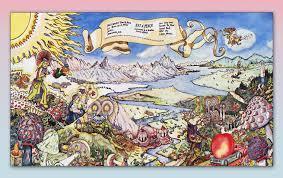
Art by Wonder Graphics – W. David Powell and Flournoy Holmes
Sitting in David’s room listening to Eat a Peach, the psychedlic gatefold artwork drew me in almost as much as the music. I didn’t know what was going on there, but I was sure it was more interesting than life in Pittsburgh and I wanted a piece. I mentioned this story in an NPR interview a few years ago about my first book, Big in China, and then I got an email from the artist, W. David Powell, who happened to hear me. He couldn’t believe what he heard and I couldn’t believe I was getting a thank you message from the guy who designed the cover of Eat a Peach – a veritable holy man! We struck up an email friendship, and I have an original piece of art in that same vein from David in the end pages of the book. It has special meaning to me, but you don’t need the same history to appreciate this work, which I can’t wait for you to see.
One Way Out: The Inside History of the Allman Brothers Band is not just a book I decided to write because I needed a project, or I could get a deal. It’s the end result of a lifetime spent thinking about, talking about, listening to – and enjoying – this band. It’s been mine, but on February 18, it becomes all of yours. I hope you like it.
Click here for a chance to win a signed copy of One Way Out.
// ]]>
February 7, 2014
Special Preview – “Revival” from the upcoming CD Play All Night
I am proud to feature “Revival” from Play All Night: Live at the Beacon Theater 1992, which will be released on February 18. Details below. Have a listen:

Betts and Haynes. Foto by Kirk West. All rights Reserved.
February 18 is going to be a busy day for Peachheads. My book One Way Out: The Inside History of the Allman Brothers Band will be launched as Sony releases a two-CD set and a long-desired DVD.
Play All Night: Live at the Beacon Theater 1992 features two discs from the band’s first extended run at the Beacon Theatre, taken from two shows, March 10 and 11, 1992. The release also features liner notes by my friend John Lynskey, editor of Hittin The Note. The Allman Brothers Band Live at Great Woods DVD features full performances, not interrupted by interviews.
I have had advances of both the CDs and DVD for some time and have been listening over and over. They are really, really good, serving as a big reminder of why I became so obsessed with the Allman Brothers Band during this era: They were damn good! This is peak stuff. This band had been together a couple of years and developed a deep chemistry, but it was still fresh enough that everyone was really excited and happy to be there. Pianist Johnny Neel was out, putting the guitars back alone at center stage and percussionist Marc Quinones had become a welcome member of the drumline. They had two albums worth of new material, and Betts and Allman were both in good shape. These performances also made me really miss Dickey Betts. He and Warren had a hell of a thing going on and it was at or close to full power in 1992. I heartily endorse these releases.
“The word ‘definitive’ gets tossed around so often it has lost some of its meaning, but this 400-page journey into the heart of rock and roll darkness deserves the accolade.” -Brad Tolinski, Guitar World Read Brad Tolinski’s Guitar World review of One Way Out here.
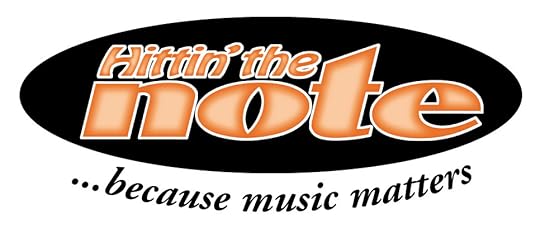 The book, CD and DVD are all available with special offers from Hittin the Note. They also have Please Be With Me, the great upcoming book by Duane’s daughter Galadrielle, new archival releases – and everything else a self-respecting Peachhead could ask for. Support these great supporters of the ABB.
The book, CD and DVD are all available with special offers from Hittin the Note. They also have Please Be With Me, the great upcoming book by Duane’s daughter Galadrielle, new archival releases – and everything else a self-respecting Peachhead could ask for. Support these great supporters of the ABB.
February 6, 2014
One Way Out excerpt and review in Guitar World
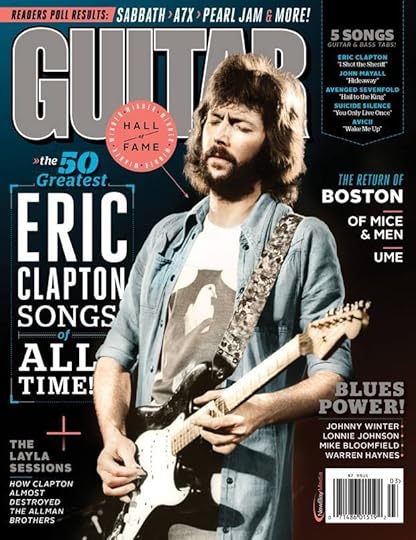 The first taste of One Way Out: The Inside History of the Allman Brothers Band can be had in the new Guitar World.
The first taste of One Way Out: The Inside History of the Allman Brothers Band can be had in the new Guitar World.
To tie in with the Clapton cover theme, they excerpted the chapter on the making of Layla and how it almost destroyed the Allman Brothers Band.
I also interviewed Warren Haynes about Play All Night: Live at the Beacon Theater 1992 and the stories run together.
GW Editor Brad Tolinski reviewed One Way Out, giving it a great reading and writing a review with admirable scope and depth. As a writer, this is truly appreciated, perhaps even more so than a positive review.
You can read the entire Guitar World review of One Way Out here.
Here’s my favorite paragraph:
“The stories are salty, unfiltered and straight from the horse’s mouth. It’s a good thing, too, because the Allmans’ story is often so bizarre and harrowing it’s hard to believe it’s true. The word ‘definitive’ gets tossed around so often it has lost some of its meaning, but this 400-page journey into the heart of rock and roll darkness deserves the accolade.”
-Brad Tolinski, Guitar World Editor in Chief
// ]]>
Amazon.com Widgets
February 5, 2014
Protected: Special Preview – “Revival” from the upcoming CD Play All Night
February 4, 2014
Big Head Todd and the Monsters “Josephina”
Big Head Todd and the Monsters have a new album, Black Beehive, which I’ve been enjoying on an advanced stream. I’ve lost touch with the band a bit but was big supporter early and put in a heck of a lot of time listening to Sister Sweetly, a great album released in 1993. The following year I went on the road with the group for a few days of the HORDE Festival, being headlined by the Allman Brothers for a Guitar World feature. I remember Todd and some of the other guys making fun of me for my ABB obsession. I need to get them a copy of One Way Out: The Inside History of the Allman Brothers Band. I also remember that I couldn’t sleep in the bunk so I sat up front and talked to the driver in the middle of the night. He had hilarious stories about driving Poison.
I am pleased to present the video for Black Beehive‘s first single, “Josephina”:
February 3, 2014
Behind the writing of One Way Out
I’m happy to say that One Way Out: An Inside History of the Allman Brothers Band will be available in Audio Book… especially happy since Jaimoe has told me it is his preferred method of reading these days.
I did the following interview with the producers of the Audio Book. It’ s a good quick look behind the scenes of the writing, explaining some of my passion for the band and some of what I learned during the writing. Even if the giant head shot of me looming in the background is a little bit creepy.
“It’s larger than the Allman Brothers.. or even about a band… It’s about the nature of long-term relationships…. It’s striking how raw Duane’s death still is to those he was close with, 40-plus years later…. It’s not something people have come to grip with.”
January 28, 2014
ABB done at end of the year – but not yet!
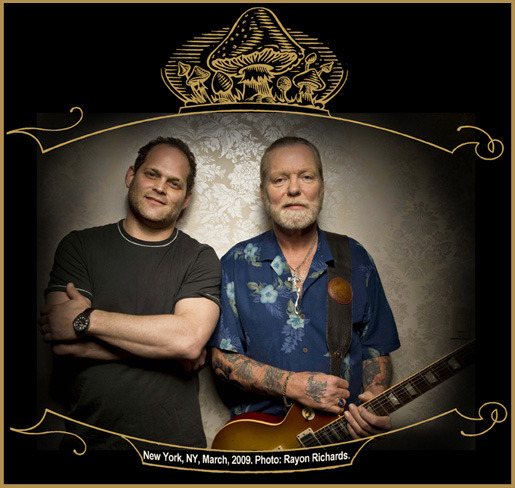 Gregg Allman told Relix that the Allman Brothers Band will no longer tour regularly after 2014.
Gregg Allman told Relix that the Allman Brothers Band will no longer tour regularly after 2014.
“This is it—this is the end of it,” he told Relix, as part of an interview for the magazine’s 40th anniversary issue. “Forty five years is enough and I want to do something else, anyway. Everyone has their own real good perspective bands.”
None of this is terribly surprising in light of Derek Trucks and Warren Haynes’ recent announcement that they will no longer tour with the band after this year. That spurred a lot of speculation about whether they would add new players and power on, and people all over the internet arguing about whether this was a good or bad idea and who could possibly be suitable replacements. Some of the discussions bordered on comical. I have felt all along like I don’t want to see them not be great.

Foto by Kirk West; 2009 rehearsal
The Relix issue is not out yet. I actually have two pieces in it: a review of the Gregg Tribute concert in Atlanta and an appreciation of the great Col Bruce Hampton and the Aquarium Rescue Unit – but they put this out online and further added to the intrigue as the ABB head into a very busy and now monumental period.
One Way Out: The Inside History of the Allman Brothers Band comes out February 18, the same day asthe excellent Play All Night: Live at the Beacon Theater 1992 two-CD set and Live at Great Woods (1991) DVD.
On March 4, Galadrielle Allman’s Please Be with Me: A Song for My Father, Duane Allman will be released. I have read this and it is a fantastic book. Together with One Way Out, it is going to provide a lot of insight into the band’s formative years and messianic leader.
A few days later, on March 7, the ABB celebrate 25 years of Beacon shows with the start of a 14-night sold-out run. Many people are treating that as a swan song – but it is not so. It’s important to remember that whatever happens, this is not the end. Not today with this news. Not the Beacon run, which ends on March 29. At most, it’s the beginning of the end. They are playing together through 2014, with Wanee (April), PeachFest (August) and Lockn (September) booked and almost surely more to come this fall, at least similar to last year’s September run. So, while no road actually goes on forever… stay calm, folks.
Also, everyone reserves the right to change their minds. And this group has surprised us too many times to carve anything in stone.
Gregg even said as much in the snippet of a Relix interview: “Whose to say? We may get together every five years and just do one play at a time.”
Win this Photo
Win this signed original 8x 10 B&W photo of the Allman Brothers at the historic Orpheum Theatre by legendary ABB tour mystic and One Way Out photo editor, Kirk West.
Comment on this post on my Facebook Page with your favorite ABB song – and version – and get your friends to like it. Comment with the most likes by January 31st at 11:59 PM wins! (US Only) Get busy.
I chose this pic because I’ve always loved it; it is the cover of An Evening With The Allman Brothers Band; and it has a very prominent place in One Way Out: The Inside History of the Allman Brothers Band.
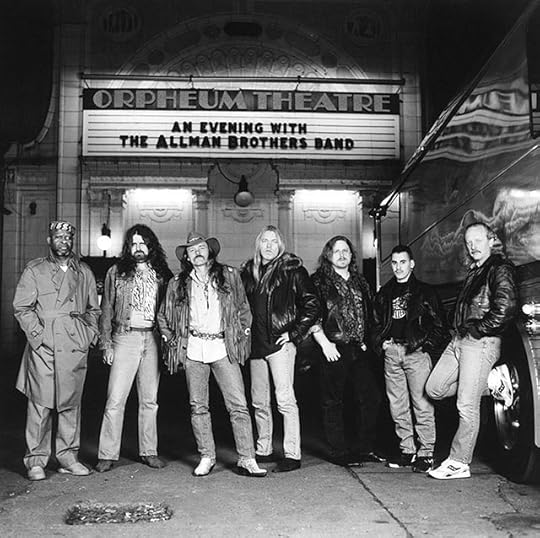
ABB at the Orpheum, Boston 1992. Foto by Kirk West.
January 20, 2014
“God Rest His Soul” – Gregg Allman’s tribute to MLK
On this MLK Day, I think it’s important to remember that when he was killed he was in Memphis marching in support of striking garbage haulers. I’m also sure many of those striking men could have and would have done a lot of other things had they had the opportunity to do so. It bothers me that we have garbage pickup today. Let’s not allow MLK Day to become another excuse for sales.
Gregg Allman wrote this song for Dr. King but it was never on one of his studio releases. He’s said that he never intended to release it and just wrote it as a personal tribute, but he also sold the song for way too cheap to producer Steve Alaimo when he needed money to get back to Los Angeles. Alaimo also bought “Melissa,” which ABB manager Phil Walden eventually bought back 50 percent of… There are multiple versions of it, and this is not my favorite but I think it’s a great tribute to a great man and the person who put this video together with pics of Dr. King did it justice.
MLK’s haunting final speech, “I Have Been to the Mountaintop” is below that. Unbelievable.
MLK’s haunting final speech, “I Have Been to the Mountaintop”:
January 18, 2014
Beijing Blues: “They say the sun is shining, but I can’t see it anywhere.”
Pollution in Beijing remains very bad, but they are NOT actually showing pictures of a sunrise. That was a bogus report which I am ashamed to admit I passed along as factual, along with many others.
I will be very happy when the lyrics to “Beijing Blues,” sound like a relic of a bygone time: ”They say the sun is shining but I don’t see it anywhere.”
In the meantime, read the Big in China excerpt below and check out Woodie Alan’s signature song, “Beijing Blues.”
From Big in China, Chapter 23, You Ain’t Going Nowhere:
I never could have made a long-term commitment to living in China, however, because of the pollution, which could be mind-bendingly bad. Rapid economic growth spurred massive construction and an explosion in car ownership, overwhelming other improvements and keeping the air a thick stew of particles and pollutants.
We always knew what we were getting into; a few days into our look-see visit, the skies became hazy and the air began to smell. The “fog” grew for two days until we couldn’t see the high-rise construction project outside our hotel-room window. “It’s good that you’re seeing this,” our guide said. “The pollution’s
not like this all the time but it does happen regularly and you should know that.”
We were too excited to pause and really contemplate the potential health effects on our whole family. That lack of attention sometimes seemed foolish. I often saw a brown mist hovering above the city when I flew in to Beijing, even on days that were crisp and blue on the ground. Many people complained about a “Beijing cough” that lingered for weeks. If we didn’t ride our bikes for a few days, we would find them covered in dust and dirt. The school kept kids indoors on particularly bad pollution days, and Eli looked outside one nasty day and said, “Aw, today’s not going to be any fun. It’s too foggy to play outside.”
Spring sandstorms were also regular occurrences, sometimes mixing with light precipitation to rain mud from the sky. It didn’t rain actual water for our first eight months in Beijing until the sky opened for a thirty-hour drenching that evoked Noah. It felt like a rebirth afterward, with everything looking
and smelling fresh and clean. The city had taken a shower, washing away a heavy layer of grime. I stepped out onto our third-floor balcony and stared dumbfounded at mountains gleaming on the horizon, visible for the first time. A sunset-painted sky reflected off ranges to the north and west, creating a vastly different landscape.
After a couple of atrocious pollution days a friend told me that she had heard of someone finding out that their lungs had been damaged by years of living in Beijing. “Living here is like smoking a pack of cigarettes a day, you know,” she said.
That sounded like an urban legend, but I couldn’t shake the thought, so I asked my radiologist father-in-law to take a chest x-ray on our next visit. The good news was that my lungs looked perfectly normal. The bad news was that they would have looked the same if I actually had started smoking a pack a day two years prior.
“Smoking causes cumulative damage and it probably wouldn’t show up in that short a time,” he said.
There was no way to measure the damage that breathing in Beijing had done to any of us, but there was certainly reason to worry. The Asian Development Bank released statistics showing that Beijing had the dirtiest air of all major Asian cities, with a pollution level seven times higher than what the World Health Organization had deemed safe. I could sometimes feel the pollution in my lungs and in my eyes, as my contacts fogged up.
I spoke to an American environmental expert based in Beijing who said simply, “When it looks really bad outside, it’s really bad.” Still, she urged me to not overthink the problem, insisting that the air was no worse than it had been in the United States or Europe forty years earlier.
“Air pollution is a real problem here, but I think it’s a disproportionate expat concern compared to all the other risks they take every day,” she said.
She was talking about driving, which was a valid point, except that driving was optional, and breathing was not.
Excerpted from Big In China: My Unlikely Adventures Raising A Family, Playing The Blues and Becoming A Star in China (Harper). Available now in all formats. Copyright 2011 by Alan Paul.




